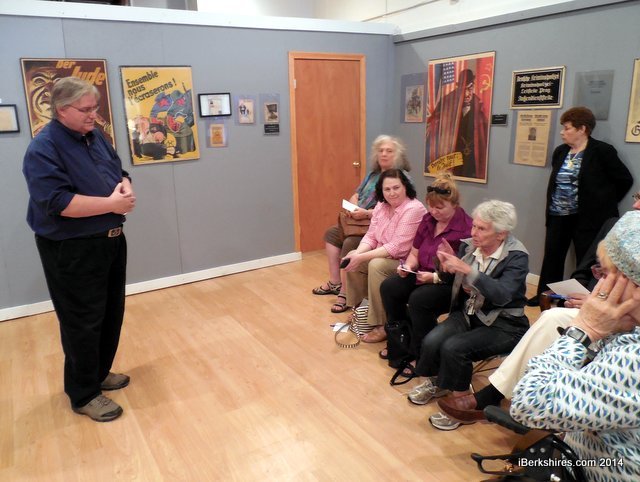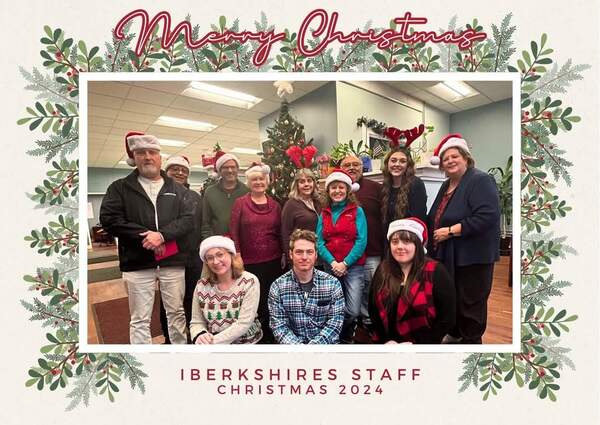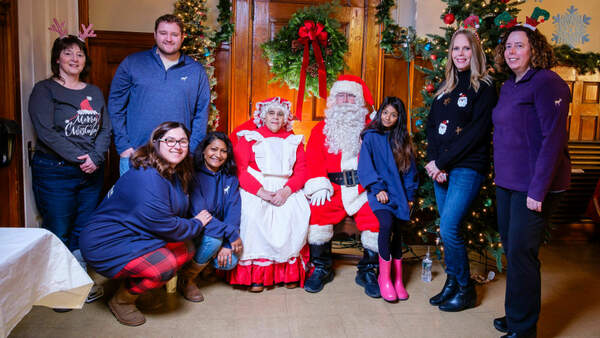North Adams Holocaust Museum Hosts Holocaust Support Group
 Museum owner Darrell K. English hosts a group of children and grandchildren of Holocaust survivors on Sunday. Museum owner Darrell K. English hosts a group of children and grandchildren of Holocaust survivors on Sunday. |
NORTH ADAMS, Mass. — Children and grandchildren of Holocaust survivors along with representatives from the German Consulate visited the New England Holocaust Institute and Museum Sunday afternoon.
The Holocaust support group from the Boston area has visited the museum in the past and came to back to ask questions, view the display, and reflect on experiences from Nazi-controlled Germany.
Founder of the museum Darrell English said the museum only features a small portion of his collection. He said it has near 250 pieces on display; his entire collection is closer to 10,000.
English said he thinks it is critical to expose Americans to the full World War II story.
"Most Americas will gladly jump to D-Day and The Battle of the Bulge but, they don’t understand the buildup before and the process that happened way before all of these other events," English said.
While English was showing some of his pieces visitor Margot Segall-Blank commented on a "Sieg Heil" sign on display at the museum and what it meant to her.
"It’s a very harmless sign, it means to be victorious that," Segall-Blank said. "That sign was in my classroom in a German school when I was 6,…and those were the first words I learned how to read. When I sit here now it brings back these memories; …Sig Heil means murder."
Segall-Blank felt discomfort with many of the Nazi propaganda displayed throughout the museum. She commented on a sign that read "Ein Volk, Ein Reich, Ein Fuhrer." This translates to "One People, One Empire, One Leader" and was a common statement seen in Nazi controlled Germany.
“Just sitting in front of the sign…brings me back to when I was 6 sitting in the classroom,” she said. “I just barely learned to read and that stared at me every day and Ein Volk, Ein Reich, Ein Fuhrer really means nothing bad, but it makes me uncomfortable.”
Segall-Blank was originally from Berlin, but was able to escape to Australia with her parents before the Nazi’s started persecuting Jewish people.
"The museum brings back a lot of memories," Segall-Blank said. "I wasn't one of the the worst sufferers and wasn't in a concentration camp, …but I just have these memories from my two or three years in school in Berlin.…I was in a German school, and I fought the Hitler Youth and it wasn't easy."
Segall-Blank said she was supposed to compete in the 1936 Winter Olympic Games in Berlin as a gymnast, but was turned away because she was Jewish.
Along with the signs, English showed other parts of his collection that included one of Oskar Schindler’s address books, propaganda film strips, and S.S. jackets worn by Nazis.
English said he sees a great importance in teaching with artifacts.
"When you give someone something that was there, when you give them an artifact you see a whole change in the person because now they are close to something that was made during that time when everything took place," he said. "It is not like just opening a book."
English said he sees it as incredibly important to keep his museum alive so local people and students will not forget the horrors of the Holocaust, which he believes is already fading from a public school education.
Visitor Gabe Padawen agreed with English’s philosophy and said it is important to teach using such artifacts.
Padawen said he left Munich Germany in 1938 at the age of 4. He said he was celebrating his 90th birthday during his visit.
"I am quite impressed; first of all by the effort given by a private citizen, but also he emphasized that he wants to show the history and how it all goes together," Padawen said. "I try to enforce that the entire Nazi movement was such total insanity that you can't really explain it any other way, and I think this collection is heading in the right direction of giving a comprehensive picture."
Although many of the Nazi items on display enveloped the horrors of Adolf Hitler’s rise to power and the eventual murder of near 6 million Jews the survivors felt it was important to keep the story alive even if it brought discomfort and uneasiness.
"You have to think 30, 40, 50 years beyond this time when there is no one around to remember this," English said. "You have to have this stuff in the front of people so that they understand what it meant."
Tags: historical, Holocaust, museum,



















